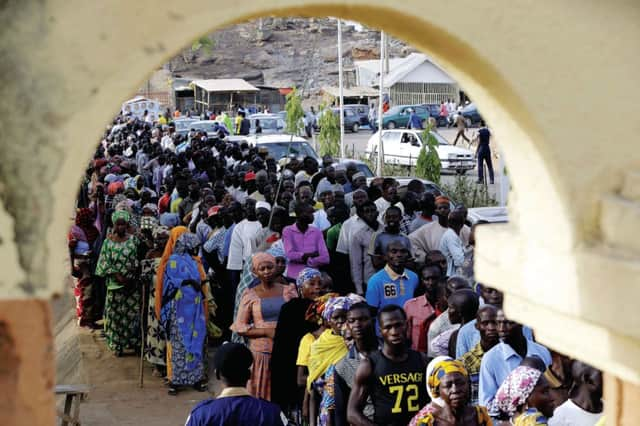Appeal for patience as Nigeria votes


Voters have to validate their voting cards using a fingerprint reader brought in for the first time to discourage the kind of fraud that has marred previous votes. But technical problems with some readers have caused lengthy delays, and voting was extended to Sunday in some regions because of the problems.
President Jonathan and former military dictator Muhammadu Buhari are the frontrunners among 14 candidates in the running to lead Africa’s most populous nation, and analysts say the result is too close to call.
Advertisement
Hide AdAdvertisement
Hide AdThe country has been wracked by increasing violence in the run-up to the vote, with dozens killed as Nigeria struggles with an Islamic uprising. Ahead of the vote, Nigeria’s military announced it had destroyed the headquarters of Boko Haram’s so-called Islamic caliphate and driven the insurgents from areas in north-east Nigeria.
But witnesses yesterday said Boko Haram gunmen forced villagers to abandon three northeastern polling stations or risk being killed. Police also said a car bomb exploded at a polling station in the south-central Enugu state but did not hurt people gathering to vote. State Police Commissioner Dan Bature said a bomb squad detonated two other cars filled with improvised explosive devices.
Nigeria’s home-grown extremists have threatened to disrupt the elections, saying democracy is a corrupt Western concept.
Streets were deserted yesterday, with only electoral officials, observers, security staff and accredited media allowed to travel by road. All sea and land borders were closed as a security precaution.
But despite the threat of violence, it was technology that caused the biggest problems due to the switch to new biometric voting machines.
Polling stations opened late in many areas as ballot materials were delivered by trucks, speedboats, motorcycles, mules and even camels, in the case of a remote northern village, according to Kayode Idowu of the Independent National Electoral Commission.
Buhari was the first voter to have his fingerprints taken at a polling station that opened 30 minutes late in Daura, his hometown in northern Katsina state. He was followed an hour later by Jonathan, in his trademark black fedora, in the southern oil-rich state of Bayelsa. Jonathan’s registration was delayed after at least three newly imported card readers failed to recognise his fingerprints.
He returned two hours later and was accredited without the machine. Afterwards he called for patience.
Advertisement
Hide AdAdvertisement
Hide Ad“I appeal to all Nigerians to be patient, no matter the pains it takes,” he said, calling for the conduct of “free and fair elections that the whole world will accept”.
Despite concerns about the speed of the voting process, electoral officials stressed that once voting started, it would not end until the last person in line had voted.
Nearly 60 million voters are registered for the first election in Nigeria’s history, where an opposition candidate has a realistic chance of defeating a sitting president.
Jonathan and Buhari signed a peace pledge and promised to accept the results of a free and fair election, although it came after dozens were killed in the run-up to the vote, highlighting the religious, ethnic and geographic divisions among Nigerians.
The Islamic uprising that killed an estimated 10,000 people last year has exacerbated relations between Christians such as Jonathan, who dominate the oil-rich south, and Muslims such as Buhari, who are the majority in the north. The population of 170 million is evenly divided between Christians and Muslims.